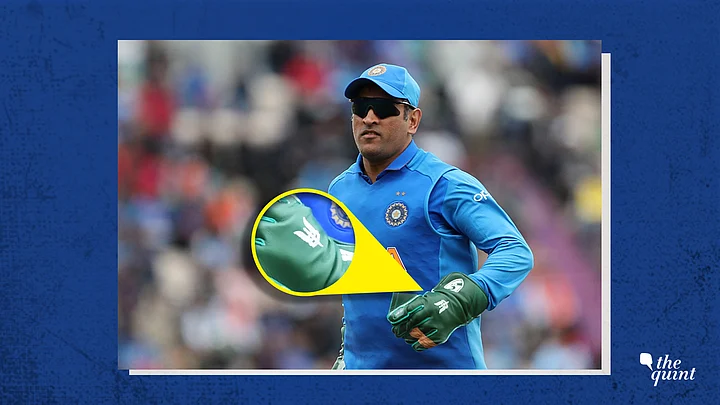Indian wicket-keeper MS Dhoni has sparked a massive controversy after sporting an Army insignia on his wicket-keeping gloves during India’s World Cup opener against South Africa.
While India’s match was on Wednesday, the logo was noticed only yesterday and has since become a massive topic of discussion which has culminated into the International Cricket Council (ICC) write to the BCCI asking the former Indian skipper to remove the logo from his glove.
While the BCCI has spoken out in support of Dhoni’s decision and has reportedly written back to the ICC to let him continue wearing the same gloves, here’s a quick primer on what the rule book says about players making a statement — personal or political — on their clothing equipment during an international cricket fixture.
Dhoni’s Logo By The Book?
The ICC Clothing and Equipment Regulations specify what kind of logos and messages can be included on a player’s clothing or equipment at ICC tournaments and events.
According to Regulation D.1, no logo is allowed to be used other than “a National Logo, a Commercial Logo, an Event Logo, a Manufacturer’s Logo, a Player’s Bat Logo, a Charity Logo, or a Non-Commercial Logo as provided in these Regulations.”
The ‘Balidaan’ emblem doesn’t fall within the definition of any of these except a “Non-Commercial Logo.”
However, as per the definition of Non-Commercial Logo, this needs to be approved by the ICC before it can be used. In fact, all types of logos specified above have to be approved by the ICC.
Therefore, for Dhoni to be able to use the emblem on his gloves, he needs to first approach the ICC and obtain approval for its use as per the Regulations (procedure described in Regulation L). This would be the case even if the emblem is not exactly the ‘Balidaan’ logo and is generic as is now being reportedly argued by Vinod Rai.
The emblem is also likely to be considered a ‘Personal Message.’ In that case, Regulation G.1 applies, which reiterates that no Personal Messages can be affixed to clothing or equipment unless approved in advance by the ICC. It is also clarified that approval “shall not be granted for messages which relate to political, religious or racial activities or causes.”
It may be argued that the emblem on Dhoni’s glove is not ‘political,’ But that determination is to be made by the ICC after a request for approval is made.
The ICC’s message to the BCCI therefore, does not necessarily mean they are considering the emblem to be political; but that approval was not sought. If Dhoni and the BCCI wish to argue against this, they need to first apply for approval under the Regulations and then make any arguments about what the emblem signifies.
(At The Quint, we question everything. Play an active role in shaping our journalism by becoming a member today.)
